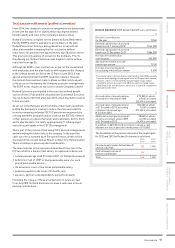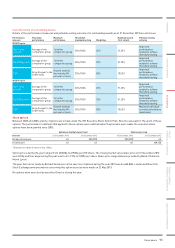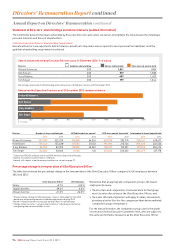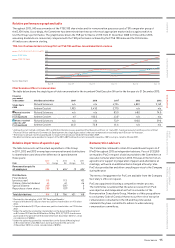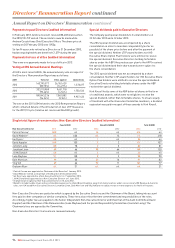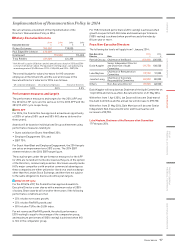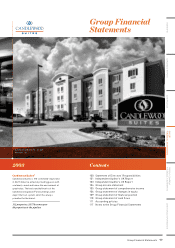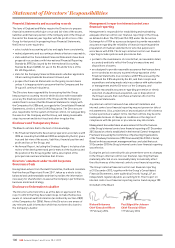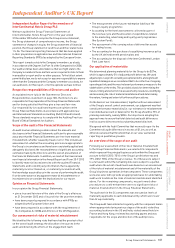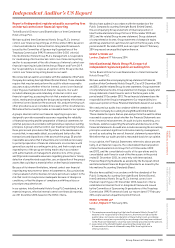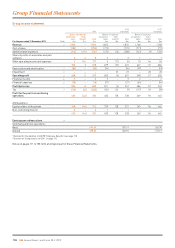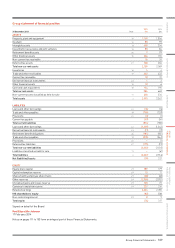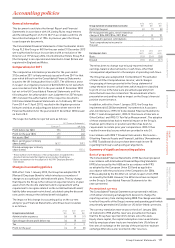Holiday Inn 2013 Annual Report Download - page 103
Download and view the complete annual report
Please find page 103 of the 2013 Holiday Inn annual report below. You can navigate through the pages in the report by either clicking on the pages listed below, or by using the keyword search tool below to find specific information within the annual report.
• The measurement of the future redemption liability of the
Group’s loyalty programme;
• Accounting for the hotel assessments collected as part of
the revenue cycle and the allocation of expenditures related
tothe marketing, advertising and loyalty point programmes
(theSystem Fund);
• The assessment of the carrying value of deferred tax assets
for trading losses;
• The accounting for the purchase of a qualifying insurance policy
by the UK defined benefit pension plan; and
• The accounting for the disposal of the InterContinental London
Park Lane hotel.
Our application of materiality
We determined planning materiality for the Group to be $27m,
which is approximately 5% of adjusted profit before tax. We used
adjusted pre-tax profit excluding exceptional items and significant
liquidated damages as we considered that to be reflective of ongoing
operating activity and the most relevant performance measure to the
stakeholders of the entity. This provided a basis for determining the
nature, timing and extent of risk assessment procedures, identifying
and assessing the risk of material misstatement and determining
the nature, timing and extent of further audit procedures.
On the basis of our risk assessment, together with our assessment
of the Group’s overall control environment, our judgement was that
overall performance materiality (i.e. our tolerance for misstatement
in an individual account or balance) for the Group should be 75% of
planning materiality, namely $20m. Our objective in adopting this
approach was to ensure that total detected and audit differences
in all accounts did not exceed our planning materiality level.
We agreed with the Audit Committee that we would report to the
Committee all audit differences in excess of $1.4m, as well as
differences below that threshold that, in our view, warranted
reporting on qualitative grounds.
An overview of the scope of our audit
Following our assessment of the risk of material misstatement
to the Group Financial Statements, we selected 24 components
which represent the principal business units within the Group and
account for 84% (2012: 70%) of the Group’s profit before tax and
79% (2012: 78%) of the Group’s revenue. 15 of these were subject
to a full audit, whilst the remaining nine were subject to a partial
audit where the extent of audit work was based on our assessment
of the risks of material misstatement and of the materiality of the
Group’s business operations in that component. These components
were also selected to provide an appropriate basis for undertaking
audit work to address the risks of material misstatement identified
above. For the remaining components, we performed other
procedures to confirm that there were no significant risks of
material misstatement in the Group Financial Statements.
The audit work in the 24 components was executed at levels of
materiality applicable to each individual entity, which were lower
than Group materiality.
The Group audit team interacted regularly with the component teams
where appropriate during various stages of the audit, visited key
accounting locations in the US and India, visited owned hotels in
France and Hong Kong, reviewed key working papers and was
responsible for the scope and direction of the audit process.
Independent Auditor Report to the members of
InterContinental Hotels Group PLC
We have audited the Group Financial Statements of
InterContinental Hotels Group PLC for the year ended
31 December 2013 which comprise the Group income statement,
theGroup statement of comprehensive income, the Group
statement of changes in equity, the Group statement of financial
position, the Group statement of cash flows and the related notes
1to 36. The financial reporting framework that has been applied
in their preparation is applicable law and International Financial
Reporting Standards (IFRSs) as adopted by the European Union.
This report is made solely to the Company’s members, as a body,
inaccordance with Chapter 3 of Part 16 of the Companies Act 2006.
Ouraudit work has been undertaken so that we might state to the
Company’s members those matters we are required to state to them
in an auditor’s report and for no other purpose. To the fullest extent
permitted by law, we do not accept or assume responsibility to anyone
other than the Company and the Company’s members as a body, for
our audit work, for this report, or for the opinions we have formed.
Respective responsibilities of Directors and auditor
As explained more fully in the Statement of Directors’
Responsibilities statement on page 100, the Directors are
responsible for the preparation of the Group Financial Statements
and for being satisfied that they give a true and fair view.
Our responsibility is to audit and express an opinion on the
Group Financial Statements in accordance with applicable law
and International Standards on Auditing (ISAs) (UK and Ireland).
Those standards require us to comply with the Auditing Practices
Board’s Ethical Standards for Auditors.
Scope of the audit of the Financial Statements
An audit involves obtaining evidence about the amounts and
disclosures in the Financial Statements sufficient to give reasonable
assurance that the Financial Statements are free from material
misstatement, whether caused by fraud or error. This includes an
assessment of: whether the accounting policies are appropriate to
the Group’s circumstances and have been consistently applied and
adequately disclosed; the reasonableness of significant accounting
estimates made by the Directors; and the overall presentation of
the Financial Statements. In addition, we read all the financial and
non-financial information in the Annual Report and Form 20-F 2013
to identify material inconsistencies with the audited Financial
Statements and to identify any information that is apparently
materially incorrect based on, or materially inconsistent with,
the knowledge acquired by us in the course of performing the audit.
If we become aware of any apparent material misstatements or
inconsistencies we consider the implications for our report.
Opinion on Financial Statements
In our opinion the Group Financial Statements:
• give a true and fair view of the state of the Group’s affairs as
at 31December 2013 and of its profit for the year then ended;
• have been properly prepared in accordance with IFRSs as
adopted by the European Union; and
• have been prepared in accordance with the requirements of
the Companies Act 2006 and Article 4 of the IAS Regulation.
Our assessment of risks of material misstatement
We identified the following risks that have had the greatest effect
on the overall audit strategy; the allocation of resources in the
audit; and directing the efforts of the engagement team:
Group Financial Statements 101
Independent Auditor’s UK Report
OVERVIEW STRATEGIC REPORT GOVERNANCE
GROUP
FINANCIAL STATEMENTS
PARENT COMPANY
FINANCIAL STATEMENTS ADDITIONAL INFORMATION


